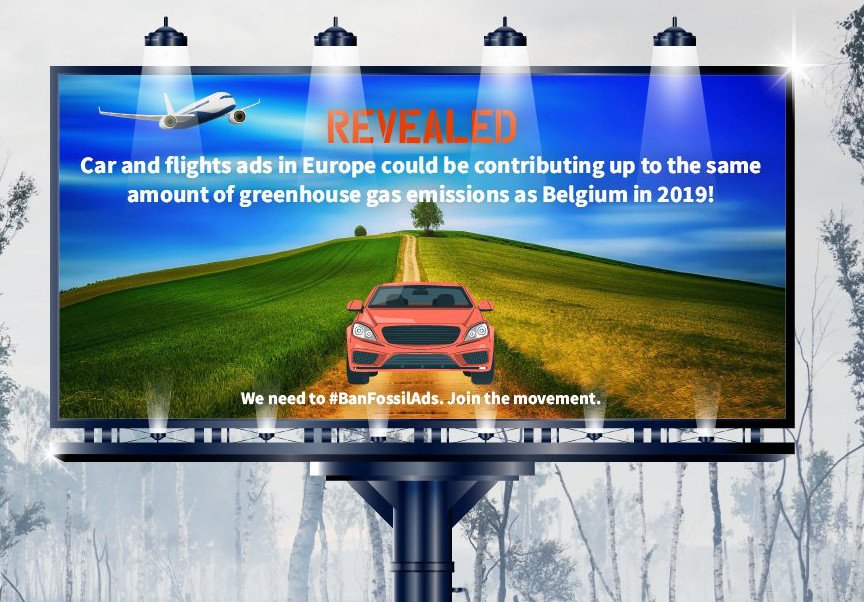New report: Advertising climate chaos - measuring the CO2 emissions associated with adverts for cars & airlines
New research by Greenpeace and the New Weather Institute reveals the extent of the climate impacts from cars and airline adverts by giving a global and european estimate on their contribution to CO2 emissions.
Quantifying the impact, assessing the damage
More on more research is demonstrating the common-sense understanding that advertising a product increases its demand. At Badvertising, we have evidenced this link in two reports using statistical analysis - one looking at the advertising for tobacco and beef products, the second focusing on adverts for SUV vehicles. The findings all point to one conclusion: advertising drives demand and therefore carries a climate and ecological impact associated with the consumption of these products.
What has so far been missing is a clear estimate of how much advertising contributes to fuelling the climate crisis. The advertising insiders at Purpose Disruptors have attempted to fill this gap by proposing a metric to quantify the CO2 impacts of adverts via a ‘Return on Carbon’ (ROCO²) - modelled on the common financial Return On Investment (ROI)- which would measure the revenue per amount of carbon emitted in the project (calculated as ‘Incremental revenue from advertising’/’Uplift in greenhouse gas emissions driven by advertising’ = ‘Revenue per ton of CO2’). The group’s latest report ‘Advertised Emissions: the carbon emissions generated by UK advertising’ used a similar reasoning to measure the CO2 emissions (estimated at 186 million tonnes CO2 equivalent for 2019) associated with the increased spend driven by advertising activities in the UK.
The latest research released by Greenpeace and the New Weather Institute substantiates those previous efforts by putting a figure on the estimated carbon emissions generated by advertising for some of the most damaging products - namely cars and airlines. Based on publicly available data on greenhouse gas emissions, advertising spend and a few selected typical ratios for the returns on advertising spend (ROAS), the study finds that globally car and airline advertising in 2019 could account for adding up between 202-606 million tonnes of greenhouse gas emissions (CO2 equivalent) - or the equivalent to the entire GHG emissions of the Netherlands to about twice that of Spain’s total emissions for 2019. For adverts aired in Europe alone, the largest estimate amounts to a whopping 122 MtCO2e of emissions, more than Belgium’s total GHG emissions in 2019.
An advert for a gas-guzzling SUV by Volkswagen with the caption “Born confident”
British Airways promoting climate-damaging air travel with the caption: “There’s no time like now to book”
At a global level, car advertising is a significant contributor to greenhouse gas emissions. The research finds it could be responsible for as much as 572 million tonnes of CO2 - or 27 million tonnes higher than Australia’s entire GHG emissions in 2019. Airline advertising, despite having a lower impact, is still an important player in driving up global emissions. It is estimated that the sector’s advertising could be associated with as much as 34 million tonnes of CO2.
“Advertising is fanning the flames of a warming world by promoting major polluters, like the aviation and car industries, just as it once blew smoke in people’s faces by selling cigarettes. The easiest way to start cutting carbon emissions is by ending the excesses that only happen because adverts are pushing higher consumption. We ended tobacco advertising to save lives, now it’s time to do the same for adverts by major climate polluters.” - Andrew Simms, New Weather Institute
Greater transparency and a ban on fossil fuel ads
The reports’ authors highlight the limited scope of the study to fully assess advertising’s global climate impact given its main focus on carmakers and airlines’ adverts associated emissions as well as its omission of historical emissions from the calculations. As a result, the overall impact of fossil fuel advertising could be far greater than assessed in this study.
Due to carmakers and airlines withholding their actual returns on advertising spending, the researchers had to use a few selected typical ratios rather than a single figure. The lack of transparency surrounding high-carbon companies’ returns on advertising spending is problematic as it prevents these industries from greater scrutiny on the real impacts of their advertising activities. This calls for companies making those figures publicly available.
There is a growing movement around Europe calling for a ban on fossil fuel advertising and sponsorship. A European Citizen Initiative is currently gathering signatures which, if adopted as a law after passing the threshold of 1 million signatures, would prevent the most polluting companies from driving up unsustainable consumption and high-carbon lifestyles.
Badvertising campaigns to end advertising fuelling the climate emergency in the UK and at the international level



